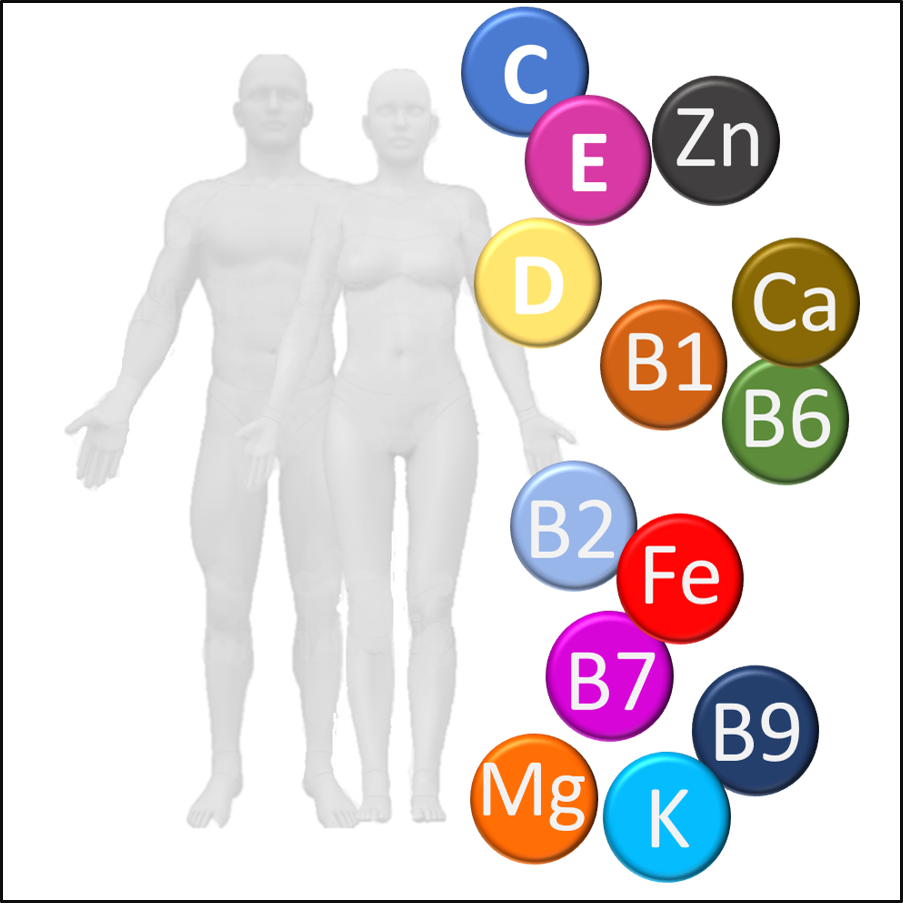
1) Definition
Micronutrients are small particles such as vitamins and minerals. They are essential for many bodily functions and deficits in micronutrients can result in various illnesses. While some micronutrients are also produced in your body, most need to be taken in through diet to achieve adequate amounts. A healthy, varied diet is the best way to make sure you take in sufficient amounts of these nutrients.
2) Description
Micronutrients are tiny particles mostly derived from your food that are needed for the healthy functioning of your body in order to survive, grow and reproduce. Examples of micronutrients are vitamins such as A, B, C, D, E and K, minerals such as calcium and magnesium, and trace elements (minerals needed in smaller amounts) such as iodine, iron and zinc. In contrast to macronutrients such as proteins, carbohydrates and fats, micronutrients are very small and take up less than 1 gram of the daily diet. In fact, high concentrations can be toxic.
Essential elements
Most micronutrients are ‘essential elements’, meaning that they should be taken in through the diet. Only some micronutrients can be produced in the body, but not in adequate amounts [1]. Examples are vitamin D that is produced in the skin, and vitamin K2, B and Biotin that are produced by gut microbiota.
Metabolic processes in humans (and in all organisms) depend on micronutrient availability. They are involved in for example as bone- and tissue-cell growth and differentiation and in the biosynthesis of e.g. hormones and amino acids. A varied diet will give you enough micronutrients and keep you healthy. However, in some cases, a shortage can occur, for example in developing countries and during challenging life phases such as early development, pregnancy or old age. Micronutrient deficiencies can have a big impact on health, ranging from somatic diseases to intellectual disability. For this reason, some micronutrients are listed as ‘essential medicines’ by the World Health Organization [2].
For example, folate (a B-vitamin) is important for the formation of red blood cells and nucleotides, the building blocks of DNA. A folate deficiency can result in blood anemia with symptoms of tiredness and is associated (through its role in homocysteine degradation) with aging-related diseases such as dementia and cardiovascular problems [3]. Folate is also well-known for its role in the healthy development of the central nervous system of a fetus in the womb [4]. Pregnant and lactating women are advised to supplement folate [5]. Green vegetables such as spinach are abundant in folate, but this is quite unstable. This means that during storage and meal preparation folate disintegrates.
Calcium, the most abundant mineral in the human body, is involved in many bodily processes such as blood clotting, muscle function, nerve transmission [6]. Insufficient calcium levels can result in muscle aches, fatigue, skin and nail problems and in the long-term decalcification of bones and teeth. Specifically, in old age, the body needs more calcium to prevent frail muscles and bones. Therefore, elderly people are advised to increase their calcium intake through dairy, leafy vegetables, nuts or soybeans.
Iodine is involved in the production of thyroid gland hormones. Iodine deficiency can occur in areas far from the sea where the soil contains little iodine. It can cause intellectual disability and thyroid gland problems. Adding iodine to kitchen salt has proven to be a cheap and efficient way to increase iodine consumption globally [7].
A shortage of micronutrients can have a devastating effect on neurodevelopment, seen for example in iodine deprived diet resulting in intellectual disability. One of the goals of the Eat2BeNICE consortium is to test the effect on diet and micronutrients on mental health and problematic behaviour seen in ADHD. Indeed, there might be an association between vitamin deficiencies and other neurodevelopmental disorders such as ADHD. For example, (maternal) vitamin D levels and several B-vitamins have been found in lower levels in the blood of ADHD patients. Whether healthy dietary habits and/or micronutrient supplementation helps in reducing ADHD symptoms needs to be tested in randomized, placebo-controlled trials, as is part of the Eat2BeNICE consortium.




